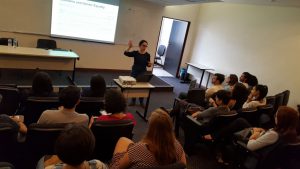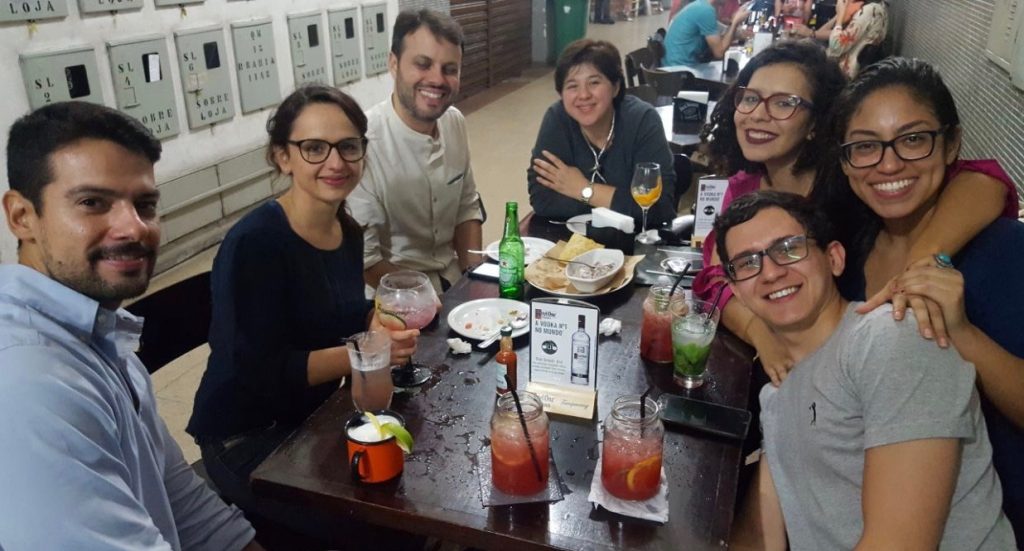The idea of a public university in the state of Minas Gerais was conceived by the ‘inconfidentes’, a Brazilian social movement who rebelled against Portuguese domination. The Universidade Federale De Minas Gerais (UFMG) was established in 1927 and since then has maintained the social purpose of its research-driven public education, despite recent budget cuts and measures promoting the privatisation of universities. The Law Faculty at UFMG provides a dynamic academic environment and has been ranked first for Law in the Brazilian national league table called the Ranking Universtiário Folha (RUF) 2017. From 20 to 25 November I had the privilege to visit the UFMG’s Law School, engage with its research and teaching activities and exchange ideas with its incredible scholars and students.
My visit to UMFG was part of the British Academy-funded Inclusionary Practices Project led by Head of Kent Law School Professor Toni Williams and UFMG’s Professor Fabricio Bertini Pasquot Polido as co-leader. This project examines multiple ways in which legal and regulatory techniques are used to implement social and economic inclusion policies in Europe, Latin America and the digital domain. The project involves a number of case studies that illustrate how the law mediates inclusionary or exclusionary practices in areas such as housing, social welfare, education, finance, employment, transnational justice and technology. Beyond its contribution to socio-legal scholarship and policy debates, the project has created new research collaborations and teaching opportunities for both academics and students at Kent and UFMG.
During my time at UFMG I interacted with the members of the GNet study group (Estudos Internacionais em Internet, Inovação e Propriedade Intelectual) and participated in the activities of the DIVERSO project (Núcleo Jurídico de Diversidade Sexual e de Gênero).
GNet is a research group coordinated by Professor Fabricio Polido that brings together academic staff and undergraduate and postgraduate students interested in the governance and regulation of technology. At the GNet meeting I talked about my research on the socio-legal dynamics of digital platforms, focusing in particular on the Fintech industry and digital humanitarian initiatives such as crowdfunding and the use of blockchain technology for aid distribution. This research, which builds upon my PhD thesis on mobile money transfer systems in Africa and my new project on digital humanitarianism, served as a starting point for a broader conversation on the limits and potential of digital technology for tackling precariousness and for a more equal distribution of power and resources. We reflected on how inclusive digital platforms are currently organised and regulated according to a logic of entrepreneurial opportunity which tends to favour the interests of corporations and their philanthrocapitalist foundations over the needs and priorities of more vulnerable people.
DIVERSO is a collective project started by Professor Marcelo Macier Ramos and Professor Pedro Gravata Nicoli with the purpose of creating a cosy space of discussion, support and common struggle for all students and stuff fighting for gender rights. As part of the DIVERSO project I attended the Gender and Sexuality weekly study group led by Professor Nicoli and presented my work on ‘Decolonising Gender, Development and Inclusion’. This interactive talk was aimed at exploring how colonialism has shaped unequal gender roles and relations in countries of the Global South and unveiling the different ways in which the Global Development Project has reproduced these inequalities. We discussed how gender inclusion policies, now a key element of the development agenda, have not only been constructed around the norms and values of Western countries, but have also been used to serve economic interests in addition or contradiction to social justice – so-called business case for gender equality and homocapitalism. This topic was chosen as a further response to current attempts to deny the responsibilities of colonialism in the creation of global inequality, but also to discuss gender and its multiple dimensions such as sexuality, race, ethnicity, religion, socio-economic status, disability, etc. in the aftermath of a recent attack on philosopher Judith Butler, author of the famous book Gender Trouble, by far-right groups in São Paulo.
The discussion ended with some collective conclusions on how we can rethink the relationship between gender, development and inclusion. Suggestions included policies aimed at tackling extreme wealth as well as extreme poverty; providing social services and basic income for all; ensuring education as a public good instead of a for-profit enterprise; regulating employment as a means for wealth redistribution instead of an instrument of social control; rethinking the relationships between Global North and Global South in light of the responsibilities of powerful Western countries since colonialism; creating a global network of solidarity that considers precarious lives across South and North; and also more radical stands such as ending capitalism and starting a revolution.
Similarly to Kent Law School, UFMG encourages the constant contamination between research and teaching thanks to committed scholars willing to train students’ imagination and help them to develop new ways of understanding the world. UFMG’s scholars such as Fabricio Polido, Pedro Nicoli, Marcelo Ramos, Emilio Peluso, Maria Fernanda Salcedo Rapoles, Brunello Stancioli, Thomas Bustamante, Maria Rosaria Barbato and Fabio Queiroz Pereira keep considering the university as an open space of exchange and experimentation where students are free to question, challenge and hope and where they can learn how to think with insight and originality. Collaborative projects like the Inclusionary Practices Project contribute to this aim of developing a research and educational environment which is distinctive and to use research as public action extended across cultures, space and time.

Dr Serena Natile is a Postdoctoral Researcher at King’s College London and an Associate Lecturer at Kent Law School, University of Kent, where she is the module convenor for Law & Social Change and part of Professor Toni Williams’ Inclusionary Practices Project. Her research interests lie in in the areas of law and development, feminist political economy, gender politics, financial inclusion and digital humanitarianism. She is currently completing a book based on her PhD thesis titled ‘Mobile Money, Gendered Walls: The Exclusionary Politics of Digital Financial Inclusion’. Besides her academic experience, Serena has worked for the Permanent Representation of Italy to the European Union (Migration and Asylum unit) and for the UNDP in Brussels and collaborated with various gender rights organisations in Italy, Kenya, Ghana and Uganda.

